-
01-01-2016
Nurses’ performance on indigenous and African-Brazilian health care practices
Revista Brasileira de Enfermagem. 2016;69(5):840-846
Abstract
Nurses’ performance on indigenous and African-Brazilian health care practices
Revista Brasileira de Enfermagem. 2016;69(5):840-846
DOI 10.1590/0034-7167.2016690504
Views0See moreABSTRACT
Objective:
to analyze the performance of nurses from the Estratégia Saúde da Família (Family Health Strategy) on health care practices rooted in African and Indigenous cultures.
Methods:
Thematic Oral History was used and interviews were conducted with seven participants, who worked with Primary Health Care in Northeastern Brazil. The analysis was based on Leininger’s Theory of Cultural Care and the intercultural concept of human rights, among others.
Results:
nurses are unaware of the religious and historical context of the ethnic groups cared for and do not appreciate their self-care practices in areas with a predominance of African and indigenous cultures. These practices coexist with the hegemonic biomedical model.
Conclusion:
the debate on cultural competence in the context of professional qualification and exercise is required, aiming to promote the nursing work in the perspective of diversity and comprehensiveness of health care.
-
01-01-2016
Accessibility assessment of assistive technology for the hearing impaired
Revista Brasileira de Enfermagem. 2016;69(5):833-839
Abstract
Accessibility assessment of assistive technology for the hearing impaired
Revista Brasileira de Enfermagem. 2016;69(5):833-839
DOI 10.1590/0034-7167.2016690503
Views0See moreABSTRACT
Objective:
to assess the automatic accessibility of assistive technology in online courses for the hearing impaired.
Method:
evaluation study guided by the Assessment and Maintenance step proposed in the Model of Development of Digital Educational Material. The software Assessor and Simulator for the Accessibility of Sites (ASES) was used to analyze the online course “Education on Sexual and Reproductive Health: the use of condoms” according to the accessibility standards of national and international websites.
Results:
an error report generated by the program identified, in each didactic module, one error and two warnings related to two international principles and six warnings involved with six national recommendations. The warnings relevant to hearing-impaired people were corrected, and the course was considered accessible by automatic assessment.
Conclusion:
we concluded that the pages of the course were considered, by the software used, appropriate to the standards of web accessibility.
-
01-01-2016
Functional disability: health conditions and physical activity practice in older adults
Revista Brasileira de Enfermagem. 2016;69(5):825-832
Abstract
Functional disability: health conditions and physical activity practice in older adults
Revista Brasileira de Enfermagem. 2016;69(5):825-832
DOI 10.1590/0034-7167.2016690502
Views0See moreABSTRACT
Objective:
to verify the prevalence of functional disability among older adults and how it can affect their health conditions and the regular practice of physical activities.
Method:
this is a household and cross-sectional study conducted with older adults of both sexes. We verified the variables associated with functional disability by Poisson’s regression.
Results:
around 420 older adults participated in this study (68.1% of them being women). We observed a statistically significant association between functional disability, the number of chronic diseases, self-assessed health conditions, and the practice of physical activities; the latter only being found among men. Older adults who reported presenting four or more chronic diseases, self-assessed their health conditions as poor, and were not used to practice physical activities, showing high prevalence of functional disability.
Conclusion:
considering the changeable character of these variables, we recommend that prevention actions be taken, mainly at primary level, to delay the emergence of disability.
-
01-01-2016
Organizational culture of a psychiatric hospital and resilience of nursing workers
Revista Brasileira de Enfermagem. 2016;69(5):817-824
Abstract
Organizational culture of a psychiatric hospital and resilience of nursing workers
Revista Brasileira de Enfermagem. 2016;69(5):817-824
DOI 10.1590/0034-7167.2016690501
Views0See moreABSTRACT
Objective:
to analyze the organizational culture of a psychiatric hospital and identify the capacity of resilience of nursing workers.
Method:
quantitative research. For data collection, were used the Brazilian Instrument for Evaluation of Organizational Culture (IBACO – Instrumento Brasileiro para Avaliação da Cultura Organizacional) and the Resilience Scale (RS).
Results:
participants reported the existence of centralization of power and devaluation of workers, despite recognizing the existence of collaboration at work and practices for improving interpersonal relations. In relation to the capacity of resilience, 50% of workers showed high level, and 42.9% a medium level of resilience. The correlation tests revealed negative values between the IBACO and RS domains, indicating that the lower the appreciation of individuals in the institution, the greater their capacity of resilience.
Conclusion:
the organizational values reflect the work organization model in the institution that devalues the workers’ needs and requires greater capacity of resilience.
-
01-01-2016
Making our nursing research matter
Revista Brasileira de Enfermagem. 2016;69(5):813-814
Abstract
Making our nursing research matter
Revista Brasileira de Enfermagem. 2016;69(5):813-814
DOI 10.1590/0034-7167-2015-0156
Views0Nurses worldwide are being increasingly exposed to new and interesting research methodologies. At the same time, they are feeling considerable pressure to ensure that the studies they propose are sufficiently methodologically rigorous to pass the scrutiny of review for funding or publication. In this context, it is increasingly important to remind ourselves that methodological rigor […]See more -
01-01-2016
Fazendo nossa pesquisa em enfermagem ser relevante
Revista Brasileira de Enfermagem. 2016;69(5):813-814
Abstract
Fazendo nossa pesquisa em enfermagem ser relevante
Revista Brasileira de Enfermagem. 2016;69(5):813-814
DOI 10.1590/0034-7167-2015-0156
Views0Enfermeiros em todo o mundo estão cada vez mais expostos a metodologias de pesquisa novas e interessantes. Ao mesmo tempo, sentem uma pressão considerável para assegurar que os estudos a que se propõem são suficientemente rigorosos metodologicamente para passar pelo crivo de avaliação para fomento ou publicação. Nesse contexto, é cada vez mais importante lembrarmos […]See more -
01-01-2016
O Espiritismo como terapia no cuidado em saúde na epilepsia
Revista Brasileira de Enfermagem. 2016;69(4):804-810
Abstract
O Espiritismo como terapia no cuidado em saúde na epilepsia
Revista Brasileira de Enfermagem. 2016;69(4):804-810
DOI 10.1590/0034-7167.2016690425i
Views0See moreRESUMEN
Objetivo:
presentar una breve historia del Espiritismo, la visión de la epilepsia por el Espiritismo, y el potencial de la espiritualidade y religiosidad como tratamientos complementarios y coadyuvantes de la epilepsia.
Método:
esta es una breve revisión del impacto de la fe, la espiritualidad y religiosidad, en particular la filosofía espiritual como tratamiento complementario de los trastornos neurológicos (centrada especialmente en la epilepsia) y la salud mental. Para esto, se realizó una revisión de la religiosidad/espiritualidad y la epilepsia en la base de datos PubMed y SciELO.
Conclusión:
el ejercicio de la espiritualidad y la religiosidad puede ser una estrategia de afrontamiento y tratamiento positivo para apoyar la terapia tradicional de los pacientes con epilepsia y otros trastornos neurológicos. Sin embargo, es necesario desmitificar muchas creencias sobre la epilepsia así como mejorar el conocimiento sobre este importante aspecto de la dimensión de salud entre profesionales, cuidadores y pacientes para explorar su potencial para el tratamiento y el apoyo.
-
REVIEW01-01-2016
The Spiritism as therapy in the health care in the epilepsy
Revista Brasileira de Enfermagem. 2016;69(4):804-810
Abstract
REVIEWThe Spiritism as therapy in the health care in the epilepsy
Revista Brasileira de Enfermagem. 2016;69(4):804-810
DOI 10.1590/0034-7167.2016690425i
Views0See moreABSTRACT
Objective:
to present a brief history of Spiritism, the vision of epilepsy by Spiritism, and the potential of spirituality and religiosity care as complementary and coadjutants treatments in epilepsy.
Method:
this is a brief review about the impact of faith, spirituality, and religiosity, particularly the Spiritism philosophy as complementary treatment to neurological disorders (particularly focusing on epilepsy) and mental health. We conduct a review of published articles (about religion/spirituality and epilepsy) in the Pubmed and SciELO databases.
Conclusion:
the exercise of spirituality and religiosity can be a positive coping strategy to support the traditional therapy of patients with epilepsy and other neurological disorders. However, it is necessary to demystify myths and beliefs about the epilepsy and improve knowledge about this important health dimension among professionals, patients, and caregivers to explore their full treatment and supportive potential.
-
06-14-2024
Duração e qualidade do sono da equipe de enfermagem brasileira que trabalha em turnos
Revista Brasileira de Enfermagem. 2024;77(2):e20230167
Abstract
Duração e qualidade do sono da equipe de enfermagem brasileira que trabalha em turnos
Revista Brasileira de Enfermagem. 2024;77(2):e20230167
DOI 10.1590/0034-7167-2023-0167
Views0See moreRESUMEN
Objetivo:
analizar la duración y calidad del sueño en profesionales de enfermería que trabajan por turnos.
Método:
investigación analítica, transversal, realizada entre septiembre de 2017 y abril de 2018, en un hospital público del sur de Brasil, con el equipo de enfermería. Se utilizó el cuestionario sociolaboral y de síntomas de salud, la Escala de Somnolencia de Epworth y el Índice de Calidad del Sueño de Pittsburgh. Los datos se presentan como estadística descriptiva e inferencial, análisis bivariado y regresión logística binaria.
Resultados:
participaron 308 profesionales de enfermería, con predominio de sueño prolongado, ausencia de somnolencia y mala calidad del sueño. La duración corta del sueño (<6 h) se asoció con turnos de día y mala calidad del sueño. La calidad del sueño se asoció con la presencia de somnolencia diurna excesiva y con el trabajo diurno.
Conclusión:
los turnos de trabajo, el insomnio y la cefalea fueron los principales factores relacionados con la falta de sueño de los profesionales de enfermería. Los resultados pueden justificar el desarrollo de investigaciones de intervención para la salud de los trabajadores.
-
ORIGINAL ARTICLE06-14-2024
Sleep duration and quality of Brazilian nursing staff who work in shifts
Revista Brasileira de Enfermagem. 2024;77(2):e20230167
Abstract
ORIGINAL ARTICLESleep duration and quality of Brazilian nursing staff who work in shifts
Revista Brasileira de Enfermagem. 2024;77(2):e20230167
DOI 10.1590/0034-7167-2023-0167
Views0See moreABSTRACT
Objective:
to analyze sleep duration and sleep quality in nursing professionals who work in shifts.
Method:
this is a cross-sectional, analytical research, carried out between September 2017 and April 2018, at a public hospital in southern Brazil, with the nursing team. A socio-occupational and health symptoms questionnaire, the Epworth Sleepiness Scale, and the Pittsburgh Sleep Quality Index were used. Data are presented as descriptive and inferential statistics, bivariate analysis, and binary logistic regression.
Results:
participants were 308 nursing professionals with a predominance of long-term sleep, absence of drowsiness, and poor sleep quality. Short-term sleep (<6h) was associated with day shift and poor sleep quality. Sleep quality was associated with presence excessive daytime sleepiness and work day shift.
Conclusion:
work shift, insomnia and headache were the main factors related short-term sleep for nursing professionals. The results may justify the development of intervention research for workers’ health.
-
ORIGINAL ARTICLE06-14-2024
Translation and Cross-Cultural Adaptation of the LYMPH-ICF Instrument for Lymphedema into Portuguese/Brazil
Revista Brasileira de Enfermagem. 2024;77(2):e20230137
Abstract
ORIGINAL ARTICLETranslation and Cross-Cultural Adaptation of the LYMPH-ICF Instrument for Lymphedema into Portuguese/Brazil
Revista Brasileira de Enfermagem. 2024;77(2):e20230137
DOI 10.1590/0034-7167-2023-0137
Views0See moreABSTRACT
Objective:
The aim of this study is to cross-culturally adapt the Lymphoedema Functioning, Disability and Health Questionnaire Lymphoedema (LYMPH-ICF) instrument into Brazilian Portuguese and conduct a pilot application (n = 10), without psychometric pretensions.
Method:
Methodological research was conducted, following the steps of translation, synthesis, back-translation, and evaluation by the expert committee. Two translators, two back-translators, and twelve professionals participated in the expert committee. A pretest was carried out with 10 patients with secondary lymphedema due to breast cancer. The degree of agreement was determined by the content validity coefficient.
Results:
It was necessary to modify 8 out of the 29 questions comprising the questionnaire, which exhibited idiomatic disagreement. However, despite these changes, there were no indications of impairments, as content reliability was achieved through a validity coefficient of 0.90.
Final Considerations:
The instrument was successfully translated and cross-culturally adapted for Brazil with a high level of agreement.
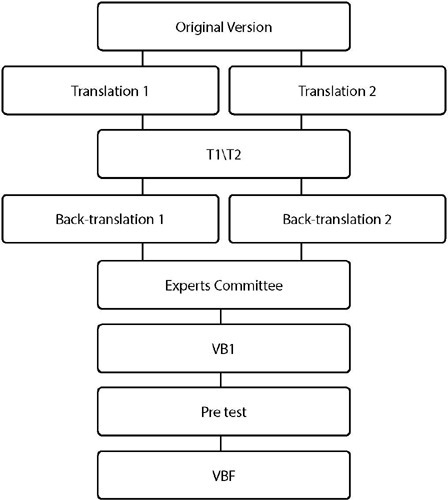
-
ORIGINAL ARTICLE05-27-2024
Fall Tailoring Interventions for Patient Safety Brazil Program: an evaluability study in a teaching hospital
Revista Brasileira de Enfermagem. 2024;77(2):e20230348
Abstract
ORIGINAL ARTICLEFall Tailoring Interventions for Patient Safety Brazil Program: an evaluability study in a teaching hospital
Revista Brasileira de Enfermagem. 2024;77(2):e20230348
DOI 10.1590/0034-7167-2023-0348
Views0See moreABSTRACT
Objectives:
to present the theoretical model, logic model, and the analysis and judgment matrix of the Fall TIPS Brazil Program.
Methods:
a qualitative, participatory research approach, in the form of an evaluability study, encompassing the phases (1) problem analysis; (2) program design, development, and adaptation to the Brazilian context; (3) program dissemination. Data were collected through document analysis and workshops.
Results:
through document analysis, workshops with stakeholders from the participating institution, and validation with key informants, it was possible to identify the program’s objectives, expected outcomes, and the target audience. This allowed the construction of theoretical and logic models and, through evaluative questions, the identification of indicators for the evaluation of the Fall TIPS Brazil Program.
Final Considerations:
this study has provided insights into the Fall TIPS program, the topic of hospital fall prevention, and the proposed models and indicators can be employed in the implementation and future evaluative processes of the program.
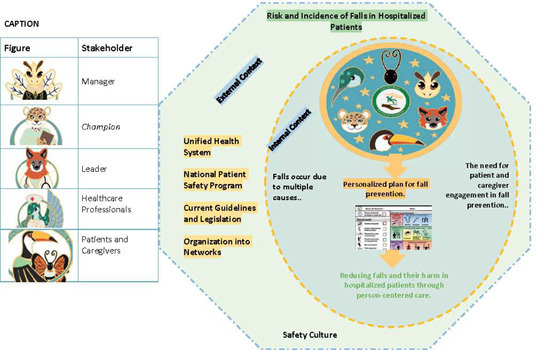
-
ORIGINAL ARTICLE05-27-2024
Nursing care protocol for critical users with tracheostomy under mechanical ventilation
Revista Brasileira de Enfermagem. 2024;77(2):e20230337
Abstract
ORIGINAL ARTICLENursing care protocol for critical users with tracheostomy under mechanical ventilation
Revista Brasileira de Enfermagem. 2024;77(2):e20230337
DOI 10.1590/0034-7167-2023-0337
Views0See moreABSTRACT
Objectives:
to develop and assess a nursing care protocol for critically ill users with tracheostomy under mechanical ventilation.
Methods:
a methodological study, developed through two phases, guided by the 5W2H management tool: I) target audience characterization and II) technology development.
Results:
thirty-four nursing professionals participated in this study, who presented educational demands in relation to care for critical users with tracheostomy, with an emphasis on standardizing care through a protocol and carrying out continuing education.
Final Considerations:
the creation and validity of new technologies aimed at this purpose enhanced the participation of nursing professionals and their empowerment in the health institution’s microsectoral actions and in macrosectoral actions, highlighting the need for public policies that guarantee the conduct of a line of care for users with tracheostomy.
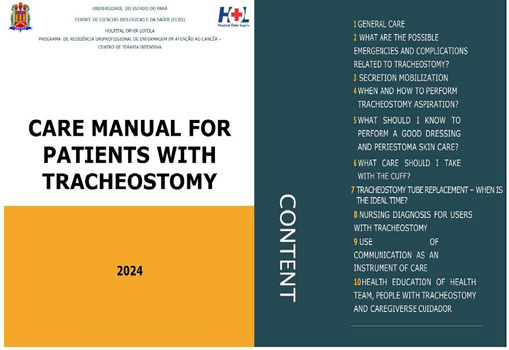
-
ORIGINAL ARTICLE05-27-2024
Assessment of educational technology in lactation physiology by health students
Revista Brasileira de Enfermagem. 2024;77(2):e20230252
Abstract
ORIGINAL ARTICLEAssessment of educational technology in lactation physiology by health students
Revista Brasileira de Enfermagem. 2024;77(2):e20230252
DOI 10.1590/0034-7167-2023-0252
Views0See moreABSTRACT
Objectives:
to assess the suitability, facilitators, and barriers of using a video clip for teaching lactation physiology to health students.
Methods:
a cross-sectional study was conducted with online data collection at a higher education institution, using the Assistive Technology Assessment Instrument and open-ended questions. The sample consisted of 88 students.
Results:
the video clip was deemed suitable in all attributes. Facilitators identified included attractiveness, musicality, and ease of access. Barriers noted were the music’s speed and the necessity for prior knowledge. The video clip achieved adequate scores for interactivity (1.71), purpose (1.77), relevance (1.64), and clarity (1.77). The overall average of the attributes was 1.72.
Conclusions:
the video clip can serve as an effective learning strategy to enhance hybrid education, potentially contributing to the promotion and support of breastfeeding. However, some barriers underscore the importance of prior knowledge for a complete understanding of the content.
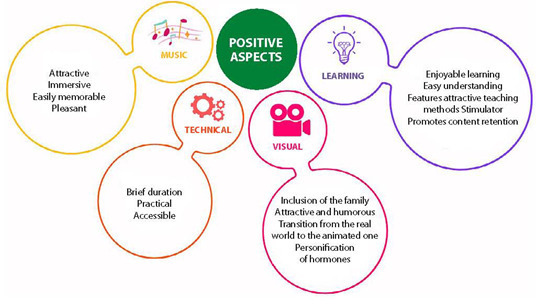
-
ORIGINAL ARTICLE05-27-2024
Technology for nursing care in a Maternal Intensive Care Unit: a methodological study
Revista Brasileira de Enfermagem. 2024;77(2):e20230202
Abstract
ORIGINAL ARTICLETechnology for nursing care in a Maternal Intensive Care Unit: a methodological study
Revista Brasileira de Enfermagem. 2024;77(2):e20230202
DOI 10.1590/0034-7167-2023-0202
Views0See moreABSTRACT
Objectives:
to develop and validate a nursing care plan in a Maternal Intensive Care Unit.
Methods:
a methodological study, developed in stages: integrative review; Nursing History construction; care plan restructuring; appearance and content validity by judges.
Results:
the history was organized into sections: Identification; Basic Human Needs; Physical Examination; and Assessment of Basic Human Needs. A care plan was restructured with 34 diagnoses, organized according to basic human needs. A satisfactory level of appearance validity of the history and care plan was obtained (Concordance Index varying between 86.3 and 100 for both instruments), and content validity with average indexes of 90.8 and 92.8, respectively. Thirty-four diagnoses, their interventions and nursing actions were consolidated.
Conclusions:
the instruments were considered relevant and pertinent in terms of appearance and content, and their use in the institution under study as well as in other similar services may be recommended.
-
05-13-2024
Metodologia qualitativa: considerações e singularidades sobre a implementação de intervenções centradas na pessoa
Revista Brasileira de Enfermagem. 2024;77(3):e770301
Abstract
Metodologia qualitativa: considerações e singularidades sobre a implementação de intervenções centradas na pessoa
Revista Brasileira de Enfermagem. 2024;77(3):e770301
DOI 10.1590/0034-7167.2024770301pt
Views0A investigação qualitativa em saúde permite a compreensão aprofundada de como a pessoa experiencia as diferentes transições de saúde, a relação com os profissionais de saúde e a passagem pelos diferentes ambientes de prática clínica. Concomitantemente, tem o potencial de suportar a tomada de decisão clínica dos profissionais e de empoderar o cidadão na sua […]See more
-
01-01-2016
Association between self-care and hospital readmissions of patients with heart failure
Revista Brasileira de Enfermagem. 2016;69(3):500-506
Abstract
Association between self-care and hospital readmissions of patients with heart failure
Revista Brasileira de Enfermagem. 2016;69(3):500-506
DOI 10.1590/0034-7167.2016690312i
Views0See moreABSTRACT
Objective:
to assess the association between self-care and the number of hospital readmissions of patients with heart failure (ADHF) and test the applicability of two self-care assessment tools. longitudinal study, performed in a cardiology reference hospital in southern Brazil.
Method:
it included 82 patients with a mean age of 61.85±12.33 years, 57.3% male. The mean score of self-care assessment found the scales European Heart Failure Self-care Behavior Scale and Self-care Scale for Patients with Heart Failure was unsatisfactory.
Results:
it was observed an average of 2.57±1.66 rehospitalization last year for decompensated heart failure. There was a correlation between self-care scores with the number of hospital readmissions for decompensated HF. Education and age were associated to self-care of HF patients.
Conclusion:
both scales assess self-care in a relevant way, and correlated their indexes.
-
01-01-2016
Knowledge management in Portuguese healthcare institutions
Revista Brasileira de Enfermagem. 2016;69(3):492-499
Abstract
Knowledge management in Portuguese healthcare institutions
Revista Brasileira de Enfermagem. 2016;69(3):492-499
DOI 10.1590/0034-7167.2016690311i
Views0See moreABSTRACT
Objective:
to evaluate the perception of healthcare institution collaborators in relation to knowledge management in the institution where they operate and analyze the existence of differences in this perception, based on the institution’s management model.
Method:
a study conducted in a sample consisting of 671 collaborators from 10 Portuguese healthcare institutions with different models of management. In order to assess the knowledge management perception, we used a score designed from and based on items from the scores available in the literature.
Results:
the perception of moderate knowledge management on the healthcare institutions and the statistically significant differences in knowledge management perception were evidenced in each management model.
Conclusion:
management knowledge takes place in healthcare institutions, and the current management model determines the way staff at these institutions manage their knowledge.
-
01-01-2016
Social impairment of patients undergoing hematopoietic stem cell transplant
Revista Brasileira de Enfermagem. 2016;69(3):484-491
Abstract
Social impairment of patients undergoing hematopoietic stem cell transplant
Revista Brasileira de Enfermagem. 2016;69(3):484-491
DOI 10.1590/0034-7167.2016690310i
Views0See moreABSTRACT
Objective:
to evaluate the impairment of social and emotional domains of hospitalized patients undergoing hematopoietic stem cells transplantation.
Method:
an observational, longitudinal study with 25 participants evaluated in the period of pre-transplant, pancytopenia and pre-hospital discharge between September 2013 and September 2014, in a reference hospital for this treatment modality in Brazil. Two international instruments were used, both of which translated and adapted to Portuguese (Brazil): Quality of Life Questionnaire-Core 30 and Functional Assessment Cancer Therapy – Bone Marrow Transplantation.
Results:
patients have shown a statistically significant decrease in the social domain, and stability of the emotional function along the course of treatment.
Conclusion:
hematopoietic stem cell transplantation changes the social function of patients with hematologic cancer during hospitalization stage. Thus, patients should receive guidance addressing the social domain in order that it can be less affected.
-
01-01-2016
Frailty and quality of life in elderly primary health care users
Revista Brasileira de Enfermagem. 2016;69(3):478-483
Abstract
Frailty and quality of life in elderly primary health care users
Revista Brasileira de Enfermagem. 2016;69(3):478-483
DOI 10.1590/0034-7167.2016690309i
Views1See moreABSTRACT
Objective:
to investigate the association between physical frailty and quality of life in elderly users of primary health care in the capital of the state of Paraná.
Method:
a cross-sectional, quantitative study with 203 elders. Data collected included: physical activity questionnaires, weight loss, fatigue/exhaustion, quality of life, performance of gait speed tests, and handgrip strength.
Results:
of the 203 older adults, 115 were pre-frail, 49 were non-frail, and 39 were frail, with a significant association with functional capacity and quality of life in all groups. The dimensions resulting from physical aspects, pain, and vitality were associated with those that were non-frail.
Conclusion:
in this study, frailty syndrome was inversely proportional to the quality of life, and significantly associated with functional capacity of older adults. Physical frailty is a manageable condition which can be targeted through geriatric nursing interventions.
-
01-01-2016
Impact of home visits on the functional capacity of patients with venous ulcers
Revista Brasileira de Enfermagem. 2016;69(3):468-477
Abstract
Impact of home visits on the functional capacity of patients with venous ulcers
Revista Brasileira de Enfermagem. 2016;69(3):468-477
DOI 10.1590/0034-7167.2016690308i
Views0See moreABSTRACT
Objective:
to assess the impact of protocol home visits on the functional capacity of adult and elderly patients with venous ulcers, before and after guidance received at home.
Method:
clinical experimental, randomized, nonblinded and controlled study, developed with 32 patients (case and control groups). Fields of research were the Wound Outpatient Care Unit of the Antônio Pedro University Hospital and households of patients treated in the outpatient unit. Data collection occurred from February to June 2014, by means of an assessment tool of the health care unit, the TINETTI index and a script for directions to be provided to study participants who received home visits.
Results:
participants in the case group showed significant and differentiated improvement post-intervention when compared to the control group, which remained stable.
Conclusion:
directions provided in the home context were beneficial to the members of the case group.
-
01-01-2016
Pressure ulcers in critically ill patients: incidence and associated factors
Revista Brasileira de Enfermagem. 2016;69(3):460-467
Abstract
Pressure ulcers in critically ill patients: incidence and associated factors
Revista Brasileira de Enfermagem. 2016;69(3):460-467
DOI 10.1590/0034-7167.2016690307i
Views0See moreABSTRACT
Objective:
to identify the incidence and describe the associated factors for pressure ulcers in critically ill patients.
Method:
this was a prospective cohort study with 77 patients, using a clinical, metabolic assessment and the associated factors for pressure ulcer, applying the risk scales (Braden and Waterlow) and assigning ulcers to categories.
Results:
an incidence of 22% (95% CI 12.6 – 31.5), with 17 patients with 32 pressure ulcers in the sacral region (47%), and of Class I (72%). The length of stay was greater than ten days (71%), most admissions were surgical (53%) or for congestive heart failure (24%), and were high risk on the Braden Scale (59%).
Conclusion:
the study highlights the high incidence of pressure ulcers, clinical and metabolic characteristics and associated factors, as well as the outcome of death, requiring, therefore, preventive measures.
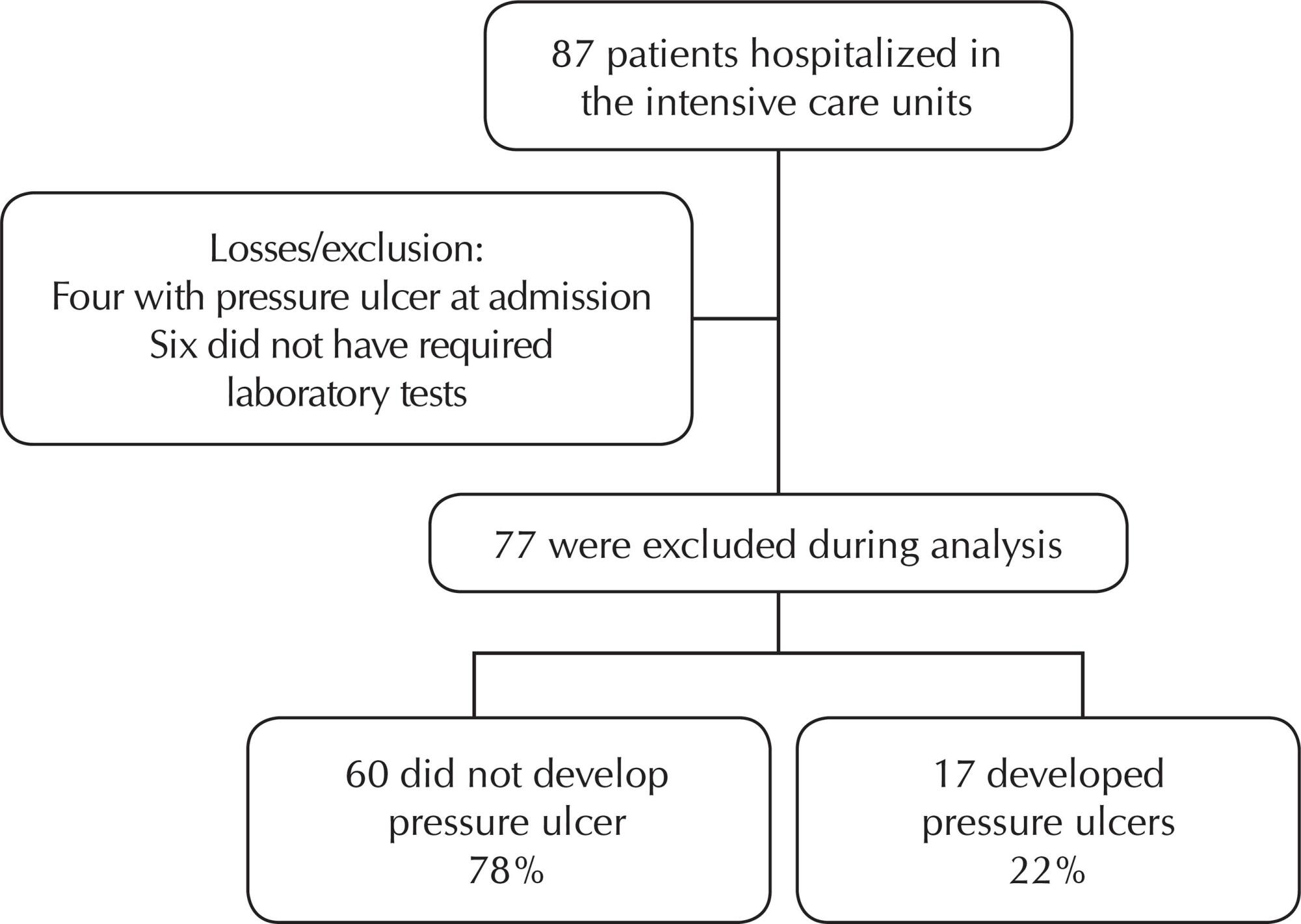
-
01-01-2016
Accreditation in a public hospital: perceptions of a multidisciplinary team
Revista Brasileira de Enfermagem. 2016;69(3):451-459
Abstract
Accreditation in a public hospital: perceptions of a multidisciplinary team
Revista Brasileira de Enfermagem. 2016;69(3):451-459
DOI 10.1590/0034-7167.2016690306i
Views1See moreABSTRACT
Objective:
to analyze the perceptions of the multidisciplinary team on Accreditation in a public hospital.
Method:
descriptive, exploratory, qualitative research, performed in May 2014, using recorded individual interviews. In total, 28 employees of a public hospital, Accredited with Excellence, answered the guiding question: “Tell me about the Accreditation system used in this hospital”. The interviews were transcribed and subjected to content analysis.
Results:
of the speeches, three categories emerged: Advantages offered by the Accreditation; Accredited public hospital resembling a private hospital; Pride/satisfaction for acting in an accredited public hospital.
Conclusion:
participants perceived Accreditation as a favorable system for a quality management in the public service because it promotes the development of professional skills and improves cost management, organizational structure, management of assistance and perception of job pride/satisfaction.
-
01-01-2016
Health status and the return to work after traffic accidents
Revista Brasileira de Enfermagem. 2016;69(3):443-450
Abstract
Health status and the return to work after traffic accidents
Revista Brasileira de Enfermagem. 2016;69(3):443-450
DOI 10.1590/0034-7167.2016690305i
Views0See moreABSTRACT
Objective:
to compare the health status of traffic accident victims, at hospital discharge and after six months, and to analyze the predictive variables of their health status and return to work.
Method:
observational, longitudinal study. Data were collected through interviews and medical records of 102 patients with a mean age of 33 years; with the majority being men and victims of motorcycle accidents. The variables were analyzed by means of validated tools, student’s t-test, multiple linear regression, and logistic regression.
Results:
there was an improvement of perception in the patients’ health status six months after hospital discharge and functional capacity. The individuals who returned to work showed better health-related quality of life evaluation.
Conclusion:
improvement of the perceived health status six months after hospital discharge was found. Factors that influenced the patients’ return to work were not identified.
Search
Search in:
Nuvem de Tags
Adolescente (85) Atenção Primária à Saúde (239) COVID-19 (91) Criança (91) Cuidados de Enfermagem (269) Educação em Enfermagem (151) Educação em Saúde (139) Enfermagem (930) Enfermagem Pediátrica (86) Estudantes de Enfermagem (77) Estudos de Validação (131) Família (87) Idoso (208) Promoção da Saúde (99) Qualidade de Vida (104) Saúde do Trabalhador (86) Saúde Mental (145) Saúde Pública (82) Segurança do Paciente (150) Tecnologia Educacional (100)



